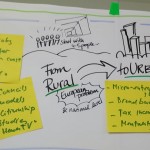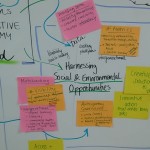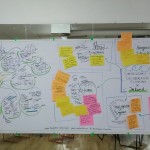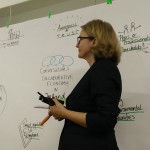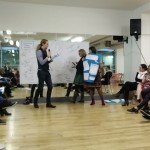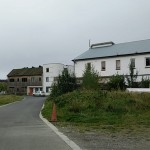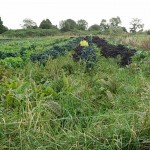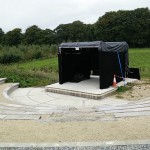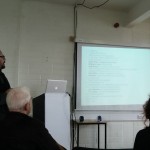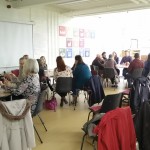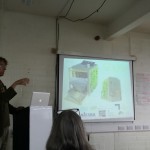A few weeks ago, I received an invitation to a Collaborative Economy workshop organised by the Single Market Forum 2017/2018 in collaboration with Sharing Economy Ireland taking place in Dublin on October 18.
On a very fresh morning (only 5 degrees) and after missing the 5:30am bus, I made it to Dublin on time.
We started with a quick round of introductions, and I found out that in the audience there were several people from the EC, guests from Denmark,UK, Portugal
and Italy, representatives of various Irish governmental and non-governmental organisations, people from academia studying the phenomenon, companies and organisations involved in the Collaborative Economy in Ireland.

Then a few of the guests had very short (4 min each) interventions, where we heard about the study initiated by DG Grow on short-term accommodation platforms, about defining the term “worker” in the case of non-standard work (DG Employment, Social Affairs and Inclusion), about a two years fact finding investigation on the role of platforms for e-commerce (DG Connect). Guests from Sharing Economy UK and Denmark (link to the Danish Govt Strategy here) spoke briefly about their countries’ specific situations.
We spent the next session sharing stories about our own involvement in the collaborative economy in Ireland. I had the chance to hear from, among others, Karolis Duoba from Tryilo, Maggy Morrissey, a photographer who has an Etsy shop and is involved in organising monthly meetups for photographers interested in monetising their work in Dublin, and Fiachra Duffy, who is working for Deliveroo in Dublin. The story that stuck with me was Simon O’Rafferty‘s story about the Trade School, an initiative that aimed to bring people together to exchange skills, while at the same time giving them the opportunity to connect with others.
During the next 3 sessions, we joined various “Conversation Tables“, each dedicated to a topic. I started with “From local to global“, where we spent a good part of the time trying to come to a shared understanding of what we all meant by “local” and by “global”. I then moved to “From rural to urban“. During the last session, we discussed “Harnessing social and environmental opportunities“, talking about what could be done to provide better support for housing, education and food issues. The format worked well- at each table we examined challenges(1st round), resources(2nd round) and solutions (3rd round), while a topic facilitator stayed with the same topic for all 3 rounds.
Before lunch, the Your Europe resource website was presented. The resource is dedicate to those who move from one European country to another for work and have to make sense of the legislation in a new country. I would have loved to have access to something like this years ago when I moved to Ireland!
In the afternoon, we were all invited to suggest topics for two rounds of Open Space sessions in relation to the future of work in the digital economy.
First, I joined a session on ‘Creativity and Freedom‘ suggested by Saoirse Sheridan, whose ElderHomeShare initiative had drawn my attention in the morning. We attempted to understand what the two concepts meant for each of us, and we ended up noting the future steps each of us wanted to take to bring more creativity and freedom into our own lives. I surprised myself telling the group how much I enjoy the creativity and freedom afforded by my academic career, which is quite a change from my usual moaning. I guess the sabbatical did wonders!
The second session I joined was titled “Are platforms creating value? If so, for whom and how?“. We spoke about how platforms are more similar to marketplaces than to corporations, the various skills required by the collaborative economy, the possible sharing of data between governments and platforms. We were all intrigued by the business model of Urban Volt, illustrating that not all the collaborative economy initiatives rely on platforms.
We came back in a circle for a round of presentations and conclusions, which was video recorded and might appear online at some point. All our discussions were illustrated throughout the day by the fantastic Sabine Soeder aka CoCreative Flow, who persuaded me I should have a go at graphic facilitation(will have to find the time though!).
It was a dense and exciting day that gave me the fantastic opportunity to meet and talk to peers interested and working in the Collaborative Economy. I left with the hope that this was only the beginning, and that we’ll be able to help disentangle these complex issues through the
SharingAndCaring COST action and the
CollabEire Special Interest Group.
The Single Market Forum 2017-2018 has organised 3 other similar workshops in other European countries before the one in Dublin. Kudos to Dana-Adriana Puia for bringing it to Ireland and to Elizabeth Douet from Sharing Economy Ireland who initiated this!
October 23 2017 | CollaborativeEconomy and Events and SharingAndCaring | No Comments »
Last Saturday, we attended the “Housing Ourselves” conference in Cloughjordan eco-village.
The conference is part of the
Convergence Festival, that is at its 20th edition.
Cultivate hosted this conference in partnership with Cloughjordan Co-Housing and
Cloughjordan Ecovillage, and its aim was to explore new models of housing, smaller homes and more liveable neighbourhoods for healthier and more sustainable local communities. The participants – from all the ways of life, all around the country, and all ages- were all interested in how a community-led approach to housing could work. The introductions session was titled “
Voices from the field“, and we really heard a variety of voices, from young couples interested to build a tiny home to seniors in search of the ideal retirement solution (as were we!).
Housing is a real problem in Ireland, and the number of people (and families) who become homeless is rising.
The event was facilitated by
Davie Philip from Cultivate. In his introduction, Davie mentioned the
Irish Community Living Unconferences series that happened earlier this year in Dublin, Cork and Galway and attempted to bring together people interested in the areas of Community Living, Co-operative Housing and Eco Villages. In Cork,
an initiative group formed following the unconference held there.
In the morning, we started with a series of presentations.
The first part was dedicated to Irish case studies.
Prof. Peadar Kirby spoke about the Cloughjordan ecovillage project started 20 years ago. The economic crisis prevented the project from being completed, and only 55 family houses were build on the existing 120 plots.
After that, Margarita Solon gave a talk about McAuley Place in Naas. The former convent was redesigned and extended to host people from all paths of life for a weekly rent of 100 Eur. As Margharita Solon emphasised, the centre does not provide care – but they really care. The initial idea emerged in 2000, and the first resident moved in in 2011. The facility includes tea rooms, a garden, a charity shop and a reception. Art exhibitions are organised periodically. The centre hosts many kinds of community events, that allow the residents to interact frequently with people from their local community.
The next to present was Hugh Brennan, one of the founders of O Cualann. O Cullann was created in 2014 and is a voluntary housing cooperative based on the principles of co-housing approved by the Irish Council for Social Housing. The first estate built is located in Ballymun. The development includes 49 units(while there are more than 700 people on the waiting list at the moment. It is dedicated to families with a household annual income between 36 and 79,000 Eur per annum. The future residents meet periodically, get to know each other and write their own rules for communal living. The development started the construction in Oct 2016, and. The first 5 families have already moved in. 70% of people are from the local area and only first time buyers are accepted.
During the next session – Learning from Europe, Davie Philip gave us a tour through various co-housing projects in Europe, from the Eva-Lanxmeer project in the Netherlands and East Whins in Findhorn, UK to the SUSI Vauban project in Freiburg, Germany, that gave a new life to a Vauban fortress. The beautiful images in Davie’s presentation gave wings to my imagination!
Paul Allen’s stories from communities formed around CAT in Wales were really fascinating. Turning a derelict mansion into a co-housing place makes a lot of sense now that I’ve listened to Paul. Paul mentioned Radical Routes , a network of co-ops and individuals working toward a world based on equality and co-operation, the One Planet Development law that was passed by the Welsh Parliament and the Llamas ecovillage.
Dreamers and Diggers, Communes Britannica and the Communities magazine were all mentioned as sources of inspiration for anyone who aspires to create a communal living place.
We had a delicious lunch prepared with local produce and we enjoyed meeting more of the participants and hearing about their reasons of being there.
The next session was dedicated to conversations in a World Café format.We discussed what hinders and what enables a cooperative approach to housing.
As factors hindering the approach, mentality, a culture favouring ownership, the lack of information and facilitators, the difficult access to land, passive and dominant people, people seeing themselves as disempowered, fear and conflict avoidance were listed. On the side of enablers, the Friendly Societies Act and CLG companies, crowdfunding and access to financial resources were named.
Community Finance Ireland and Clann Credo were mentioned as potential funding sources for such projects, and the example of the Calann Camphill Community was brought into discussion. We watched this video and got a better idea of the goals of the Camphill Communities, which I had only heard vaguely mentioned before.
The PIMBY concept (as opposed to NIMBY) was mentioned in relation to this inclusive neighbourhood project involving mutually interested citizens.
The next set of presentations, dedicated to Financing Cooperative Housing Projects, started with John Masterton, the Head Financial Officer of Cooperative Housing Ireland. The organisation was formed in 1973. The houses they develop are 25-30% cheaper, and they currently have built 5800 houses that are owner occupied. 2300 houses are under management, and 600 units are leased. They are approved to borrow from the Housing Finance Agency. The building of a 8-10 houses estate involves the identification of a site, a general specification and contracts signed with all future home owners.
Finally, Jackson Moulding and Anna Hope from Bristol’s Ecomotive spoke about their work in Bristol. Jackson had just returned from a 2 months study trip through Japan, the US, and Canada, where he sought inspiration from other co-housing projects. Jackson and Anna initiated the Ashley Vale Action Group, building their own houses in an area that was initially supposed to become a parking lot. Jackson spoke enthusiastically about Bristol as an ecosystem of innovation, where things often happen in spite of the local authorities. He maintained that “a No is an uneducated Yes”, and it is our duty to educate the people around us when it comes to social innovation.
The final discussion was dedicated to Community Led Housing and Modular Homes, and ended with a reflection on the day.
I found the conference extremely well organised and informative. It was useful both from a personal point of view, giving me alternative ideas for when we’ll retire, and professionally, providing me with a unique chance to reflect on the existing gaps in the efforts toward ensuring proper housing for everyone in Ireland that technology might help filling. I am already looking forward to the next edition of Housing Ourselves, which will take place in May 2018.
September 23 2017 | CollaborativeEconomy and Communities and Events | No Comments »


